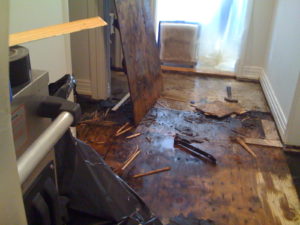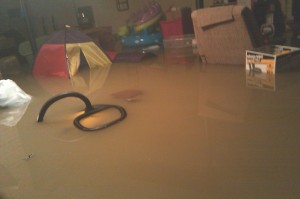What does my homeowners insurance cover? Water is known for penetrating structural cavities and creating growing pockets of saturation without the knowledge of the homeowner. Unfortunately, it often requires sophisticated tools and technology to find the source of such water damage. If the moisture remains undetected, it causes damages that eventually lead to an expensive restoration process. IICRC-certified restoration specialists possess the skills, knowledge and equipment needed to dry a building and stop the source of the damage. They monitor conditions carefully to help prevent future issues and problematic mold.
Always be sure that it is safe to enter a building that was previously flooded. Look for structural damages that create falling dangers, electrical hazards and other issues. Wear rubber boots and gloves, and wear a safety hat that does not conduct electricity. Also, a respirator will help protect from airborne health hazards. If the building is known for containing asbestos, lead paint or other harmful substances, contact a qualified professional for help. These are some important cleanup tips to follow:
- Act quickly to minimize the severity of the damage and prevent mold growth that may not be covered.
- Ventilate the area well to help it dry faster.
- Assess the damages to belongings and the structure, and make a list of all damages.
- Take photos of specific damages if possible.
- If sewage is present, leave and have a professional conduct the inspection.
- Expose pockets of saturation such as layers between building materials to help them dry.
- Clean the area as much as possible when it is safe to do so.
- Confirm that all pockets of moisture have been thoroughly dried before starting reconstruction.
Sewage can be one of the biggest dangers associated with water damage. The bacteria and pathogens commonly found in it can cause serious health problems for homeowners, their children and their pets. These are some important tips for dealing with sewage:
- Anyone working on sewage should have current Hepatitis B and other important vaccinations.
- Anyone who is on prescription drugs or chemotherapy should not work around sewage.
- People with immune disorders, pregnant women, elderly adults and young children should not be near sewage.
- The affected building must be evacuated unless the sewage-damaged area is properly sealed off.
- Textiles, carpets and padding should be replaced and not washed.
- Sewage-saturated drywall must be discarded and replaced.
- Only trained professionals should perform sewage remediation tasks, and an environmental professional should inspect the property afterward.
Be sure that these tasks are completed before attempting to reoccupy the home. Living in a home with mold and especially improperly treated sewage damage can have expensive and lasting effects on health. To learn more about this topic, ask your agent about Water and Sewage Damage Coverage.
About The Andrew Agency
The Andrew Agency is an independent insurance agency providing service to clients throughout Virginia, Maryland and D.C. If you have questions about homeowners, auto, or umbrella insurance contact us at 804.320.2886.












